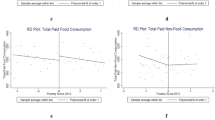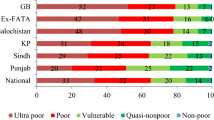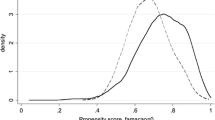Abstract
This study examines the impact of cash support from the Benazir Income Support Program (BISP) on willingness to pay for environmental services (WTPfES) among the ultra-poor in Pakistan using a quasi-experimental approach. We conduct empirical analysis using cross-sectional data of 1200 households by applying the regression discontinuity design (RDD) approach. The RDD-based empirical results show that BISP cash support positively impacts the willingness to pay for environmental services such as drinking water, sanitation, and waste disposal management services. The empirical analysis further depicts that cash assistance has a positive and significant impact on the willingness to participate in environmental services at the household and community levels. In addition, the additional income from the BISP helps families achieve better living standards and improve environmental services. The use of environmental services ultimately leads to better health among the target groups. The government may expand unconditional cash support to increase the use of quality environmental services.

Source: Author’s calculation based on survey data

Source: Author’s calculations

Source: Author’s calculations based on survey data

Source: Author’s own calculations based on survey data

Source: Author’s calculations based on survey data

Source: Author’s analysis of survey data
Similar content being viewed by others
Data availability
The data and replication files are available on request from the corresponding author.
Notes
A bulk of literature has established a significant role of CTPs to alleviate poverty and improve socioeconomic well-being of poor (Awaworyi Churchill et al. 2021; Bhallaet al. 2018; Cahyadi et al. 2019; Del Boca et al. 2021; Habimana et al. 2021; Handa et al. 2012; Hidayatina and Garces-Ozanne 2019; Kilburn et al. 2020; Lawlor et al. 2019; Prencipe et al.2021).
Apart from direct approach, literature also provides an indirect approach to estimate WTPfES using observed use behavior (revealed preferences). Given the nature of study, we use direct approach method based on contingent valuation method (CVM).
References
Alatas V, Banerjee AV, Hanna R, Olken BA, Tobias J (2012) Targeting the poor: evidence from a field experiment in Indonesia. American Economic Review 102(4):1206–1240
Alix-Garcia, Jennifer M, Craig McIntosh, Katharine R E Sims, and Jarrod R Welch. 2013. “The Ecological Footprint of Poverty Alleviation: Evidence from Mexico’s Oportunidades Program.” Review of Economics and Statistics 95(2): 417–35.
Ambler, K., & de Brauw, A. (2017). The impacts of cash transfers on women’s empowerment: learning from Pakistan’s BISP program. The World Bank.
Ambler, K., & de Brauw, A. (2019). Household labor supply and social protection: evidence from Pakistan’s BISP cash transfer program (Vol. 1815). Intl Food Policy Res Inst.
Asfaw, S., Daidone, S., Davis, B., Dewbre, J., Romeo, A., Djebbari, H., … Covarrubias, K. (2012). Analytical framework for evaluating the productive impact of cash transfer programmes on household behaviour.
Awaworyi Churchill S, Iqbal N, Nawaz S, Yew SL (2021) Unconditional cash transfers, child labour and education: theory and evidence. J Econ Behav Organ 186:437–457. https://doi.org/10.1016/j.jebo.2021.04.012
Banerjee AV, Hanna R, Kreindler GE, Olken BA (2017) Debunking the stereotype of the lazy welfare recipient: evidence from cash transfer programs. The World Bank Research Observer 32(2):155–184
Banerjee AV, Karlan D, Zinman J (2015) Six randomized evaluations of microcredit: Introduction and further steps. Am Econ J Appl Econ 7(1):1–21
Barca V, Brook S, Holland J, Otulana M, Pozarny P (2015) Qualitative research and analyses of the economic impacts of cash transfer programmes in Sub-Saharan Africa: Synthesis Report. FAO, Rome
Barrientos A (2012) Social transfers and growth: what do we know? What do we need to find out? World Dev 40(1):11–20. https://doi.org/10.1016/j.worlddev.2011.05.012
Bhalla G, Handa S, Angeles G, Seidenfeld D (2018) The effect of cash transfers and household vulnerability on food security in Zimbabwe. Food Policy 74:82–99
Börner J, Baylis K, Corbera E, Ezzine-de-Blas D, Honey-Rosés J, Persson UM, Wunder S (2017) The effectiveness of payments for environmental services. World Dev 96:359–374. https://doi.org/10.1016/J.WORLDDEV.2017.03.020
Cahyadi N, Hanna R, Olken BA, Prima RA, Satriawan E, Syamsulhakim E (2019) Cumulative impacts of conditional cash transfer programs: experimental evidence from Indonesia. Am Econ J: Econ Pol.
Cameron L, Chase C, Contreras Suarez D (2021) Relationship between water and sanitation and maternal health: evidence from Indonesia. World Dev 147:105637. https://doi.org/10.1016/j.worlddev.2021.105637
Cattaneo, Matias D, Michael Jansson, and **nwei Ma. 2018. “Manipulation Testing Based on Density Discontinuity.” The Stata Journal 18(1): 234–61.
Cronk R, Guo A, Fleming L, Bartram J (2021) Factors associated with water quality, sanitation, and hygiene in rural schools in 14 low- and middle-income countries. Sci Total Environ 761:144226. https://doi.org/10.1016/j.scitotenv.2020.144226
De Buck E, Van Remoortel H, Hannes K, Govender T, Naidoo S, Avau B, … Cargo M (2017) Approaches to promote handwashing and sanitation behaviour change in low-and middle-income countries: a mixed method systematic review. Campbell System Rev, 13(1), 1–447
Del Boca D, Pronzato C, Sorrenti G (2021) Conditional cash transfer programs and household labor supply. Eur Econ Rev 136:103755. https://doi.org/10.1016/j.euroecorev.2021.103755
Dupont DP (2000) Gender and willingness-to-pay for recreational benefits from water. Int Instit Fish Econ Trade (Iifet)
Dupont DP (2004) Do children matter? An examination of gender differences in environmental valuation. Ecol Econ 49(3):273–286. https://doi.org/10.1016/j.ecolecon.2004.01.013
Eridadi HM, Yoshihiko I, Alemayehu E, Kiwanuka M (2021) Evaluation of willingness to pay toward improving water supply services in Sebeta town, Ethiopia. Journal of Water, Sanitation and Hygiene for Development 11(2):282–294. https://doi.org/10.2166/washdev.2021.204
Fahad S, **g W (2018) Evaluation of Pakistani farmers’ willingness to pay for crop insurance using contingent valuation method: the case of Khyber Pakhtunkhwa province. Land Use Policy 72:570–577. https://doi.org/10.1016/j.landusepol.2017.12.024
Fonta WM, Ichoku HE (2005) The application of contingent valuation method to community-led financing schemes: evidence from rural Cameroon. J Develop Areas 39(1):109–126
Gertler, Paul J, Sebastian W Martinez, and Marta Rubio-Codina. 2012. “Investing Cash Transfers to Raise Long-Term Living Standards.” American Economic Journal: Applied Economics 4(1): 164–92. http://www.aeaweb.org/articles?id=10.1257/app.4.1.164.
GoP, G. of P. (2018). Benazir income support programme: final impact evaluation report. Islamabad. Retrieved on 20 June 2021 from http://bisp.gov.pk/wp-content/uploads/2017/02/BISP_FinalImpactEvaluationReport_FINAL-5.pdf
GoP, G. of P. (2021). Pakistan Social and Living Standards Measurements (PSLM) 2018–19. Islamabad, Pakistan. Retrieved on 20 June 2021 from http://www.pbs.gov.pk/sites/default/files//pslm/publications/pslm_hies_2018_19_provincial/key_findings_report_of_plsm_hies_2018_19.pdf
Guo X, Liu H, Mao X, ** J, Chen D, Cheng S (2014) Willingness to pay for renewable electricity: a contingent valuation study in Bei**g, China. Energy Policy 68:340–347. https://doi.org/10.1016/j.enpol.2013.11.032
Habimana D, Haughton J, Nkurunziza J, Haughton DM-A (2021) Measuring the impact of unconditional cash transfers on consumption and poverty in Rwanda. World Development Perspectives 23:100341. https://doi.org/10.1016/j.wdp.2021.100341
Handa S, Huang C, Hypher N, Teixeira C, Soares FV, Davis B (2012) Targeting effectiveness of social cash transfer programmes in three African countries. Journal of Development Effectiveness 4(1):78–108
Hanh J, Todd P, Klaauw WV, Der. (2001) Identification and Estimation of Treatment Effects with a Regression-Discontinuity Design. Econometrica 69:201–209. https://doi.org/10.1080/0305006790150101
Hanna R, Oliva P (2015) Moving up the energy ladder: the effect of an increase in economic well-being on the fuel consumption choices of the poor in India. American Economic Review 105(5):242–246
Haushofer J, Chemin M, Jang C, Abraham J (2020) Economic and psychological effects of health insurance and cash transfers: Evidence from a randomized experiment in Kenya. Journal of Development Economics 144:102416. https://doi.org/10.1016/j.jdeveco.2019.102416
Haq M, Mustafa U, Ahmad I (2007) Household’s willingness to pay for safe drinking water: a case study of Abbottabad district. The Pakistan Development Review, 46(4), 1137–1153. https://doi.org/10.30541/v46i4IIpp.1137-1153
Hidayatina A, Garces-Ozanne A (2019) Can cash transfers mitigate child labour? Evidence from Indonesia’s cash transfer programme for poor students in Java. World Development Perspectives 15:100129. https://doi.org/10.1016/j.wdp.2019.100129
Iqbal N, Nawaz S (2017) Spatial differences and socioeconomic determinants of health poverty. Pakistan Develop Rev, 56(3), 221–248.
Iqbal N, Nawaz S (2020) Cash transfers and residential demand for electricity: insights from BISP, Pakistan. Environmental Science and Pollution Research. Retrieved from https://doi.org/10.1007/s11356-020-11384-w
Iqbal T, Farooq S, Padda IUH (2020) Can empowerment be enhanced by putting cash in the hands of poor women? Learning from Pakistan’s BISP Program. Eur J Develop Res, 1–33
Garcia S, Cuartas J (2021) Can poverty alleviation programs crowd-in private support? Short- and Middle-Run Effects of a Conditional Cash Transfer Program on Inter-Household Transfers. Journal of Social Policy 50(3):511–532. https://doi.org/10.1017/S0047279420000240
Kilburn K, Ferrone L, Pettifor A, Wagner R, Gómez-Olivé FX, Kahn K (2020) The impact of a conditional cash transfer on multidimensional deprivation of young women: evidence from South Africa’s HTPN 068. Soc Indic Res. https://doi.org/10.1007/s11205-020-02367-y
Kopf D (2016) More money less problems: definitive data on what poor people buy when they’re just given cash. Quartz.
Kosec K, Mo CH (2019) Does relative deprivation condition the effects of social protection programs on political attitudes? Experimental evidence from Pakistan
Lawlor, K., Handa, S., Seidenfeld, D., Team, Z. C. T. E (2019) Cash transfers enable households to cope with agricultural production and price shocks: evidence from Zambia. J Development Stud 55(2):209–226
Lee DS, Lemieux T (2010) Regression discontinuity designs in economics. J Econ Lit 48(2):281–355
Lim S-Y, Kim H-J, Yoo S-H (2017) Public’s willingness to pay a premium for bioethanol in Korea: a contingent valuation study. Energy Policy 101:20–27. https://doi.org/10.1016/j.enpol.2016.11.010
López-Mosquera N (2016) Gender differences, theory of planned behavior and willingness to pay. J Environ Psychol 45:165–175. https://doi.org/10.1016/j.jenvp.2016.01.006
Maskey B, Singh M (2017) Households’ willingness to pay for improved waste collection service in Gorkha municipality of Nepal. Environments 4(4):77. https://doi.org/10.3390/environments4040077
Meunier S, Manning DT, Quéval L, Cherni JA, Dessante P, Zimmerle D (2019) Determinants of the marginal willingness to pay for improved domestic water and irrigation in partially electrified Rwandan villages. Int J Sust Dev World 26(6):547–559. https://doi.org/10.1080/13504509.2019.1626780
Mezgebo GK, Ewnetu Z (2015) Households willingness to pay for improved water services in Urban areas: a case study from Nebelet town, Ethiopia. J Dev Agric Econ 7(1):12–19
Mitchell RC, Carson RT (1989) Using surveys to value public goods: the contingent valuation method (1st Editio). Rff Press, New York, NY, USA
Moffa M, Cronk R, Fleming L, Tidwell JB (2021) Measuring household hygiene access and handwashing behaviors: findings from 14 low- and middle-income countries. Int J Hyg Environ Health 237:113810. https://doi.org/10.1016/j.ijheh.2021.113810
Muhammad AA, Shah S, Hussain A, Hayat U (2014) Assessing household willingness to pay for quality sanitation services in urban areas of Pakistan. World J Environ Biosci 7(1):26–31
Nawaz S, Iqbal N (2020) The impact of unconditional cash transfer on fuel choices among ultra-poor in Pakistan: quasi-experimental evidence from the Benazir Income Support Program. Energy Policy 142:111535. https://doi.org/10.1016/j.enpol.2020.111535
Nawaz S, Iqbal N (2021) How cash transfers program affects environmental poverty among ultra-poor? Insights from the BISP in Pakistan. Ener Pol, 148(B), 111978. https://doi.org/10.1016/j.enpol.2020.111978
Nayab D, Farooq S (2014) Effectiveness of cash transfer programmes for household welfare in Pakistan: the case of the Benazir Income Support Programme. Pakistan Develop Rev, 53(2), 145–174
Parveen S, Ahmad J, Rahman MU (2016) Estimating willingness to pay for drinking water quality in Nowshera Pakistan: a domestic study for public health. Int J African Asian Stud J 19:48–56
Peters DH, Garg A, Bloom G, Walker DG, Brieger WR, Hafizur Rahman M (2008) Poverty and access to health care in develo** countries. Ann N Y Acad Sci 1136(1):161–171
Prencipe L, Houweling TAJ, van Lenthe FJ, Palermo T (2021) Do conditional cash transfers improve mental health? Evidence from Tanzania’s governmental social protection program. J Adolesc Health. https://doi.org/10.1016/j.jadohealth.2021.04.033
Prüss-Ustün A, Wolf J, Bartram J, Clasen T, Cumming O, Freeman MC, … Johnston R (2019) Burden of disease from inadequate water, sanitation and hygiene for selected adverse health outcomes: an updated analysis with a focus on low-and middle-income countries. Int J Hygiene Environ Health, 222(5), 765–777
Renzaho A, Chitekwe S, Chen W, Rijal S, Dhakal T, Chikazaza IR, Dahal P (2018) Impact of a multidimensional child cash grant programme on water, sanitation and hygiene in Nepal. Journal of Water, Sanitation and Hygiene for Development 8(3):520–532
Solo TM, Joyce S, Perez E (1993) Constraints in providing water and sanitation services to the urban poor. Water and Sanitation for Health Project
Thistlewaite DL, Campbell DTT (1960) Regression-discontinuity analysis: an alternative to the ex post facto experiment. J Educ Psychol 51(6):309–317
Tilley E, Günther I (2016) The impact of conditional cash transfer on toilet use in eThekwini. South Africa Sustainability 8(10):1070–1086
UNICEF, WHO (2021) Assessing the affordability of water, sanitation and hygiene: Pakistan Country Case Study. New York, NY, USA, accessed on June 20, 2021
Venkatachalam L (2004) The contingent valuation method: a review. Environ Impact Assess Rev 24(1):89–124. https://doi.org/10.1016/S0195-9255(03)00138-0
WB, W. B. (2017). Closing the gap: the state of social safety nets 2017. Washington, DC. Retrieved on 20 June 2021 from http://documents.worldbank.org/curated/en/811281494500586712/pdf/114866-WP-PUBLIC-10-5-2017-10-41-8-ClosingtheGapBrochure.pdf
WHO, & UNICEF. (2021). Progress on household drinking water, sanitation and hygiene 2000–2020: five years into the SDGs. Geneva: Switzerland. Retrieved on 20 June 2021 from https://www.who.int/publications/i/item/progress-on-household-drinking-water-sanitation-and-hygiene-five-years-into-the-sdgs
**ong K, Kong F, Zhang N, Lei N, Sun C (2018) Analysis of the factors influencing willingness to pay and payout level for ecological environment improvement of the Ganjiang river basin. Sustainibility 10:2149. https://doi.org/10.3390/su10072149
Author information
Authors and Affiliations
Contributions
All authors contributed equally to this work. Saima Nawaz contributed to the paper by conceptualization study and develo** paper. Fatima Gul collected the data for empirical analysis and performed analysis.
Corresponding author
Ethics declarations
Ethics approval
Not applicable.
Consent to participate
Not applicable.
Consent for publication
Not applicable.
Competing interests
The authors declare no competing interests.
Disclaimer
The view presented in the article is those of the authors. The authors are responsible for any errors.
Additional information
Responsible Editor: Nicholas Apergis
Publisher's note
Springer Nature remains neutral with regard to jurisdictional claims in published maps and institutional affiliations.
Rights and permissions
About this article
Cite this article
Nawaz, S., Gul, F. Cash transfer program and willingness to pay for environmental services among the ultra-poor in Pakistan. Environ Sci Pollut Res 29, 30249–30264 (2022). https://doi.org/10.1007/s11356-021-17922-4
Received:
Accepted:
Published:
Issue Date:
DOI: https://doi.org/10.1007/s11356-021-17922-4





